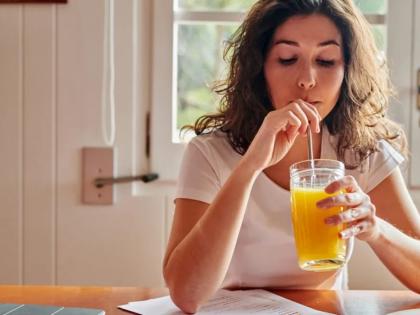Health Tips: Fruit Juice and Soft Drinks Equally Harmful For Our Health? Here's What Expert Says
By Lokmat Times Desk | Updated: August 30, 2025 18:07 IST2025-08-30T18:06:01+5:302025-08-30T18:07:24+5:30
Most people opt for juice over soft drink considering it as healthy. Truth is both real juice and soft ...

Health Tips: Fruit Juice and Soft Drinks Equally Harmful For Our Health? Here's What Expert Says
Most people opt for juice over soft drink considering it as healthy. Truth is both real juice and soft drink contains high sugar level including the juices that we make at home. Diabetes specialist Dr Bhagyesh Kulkarni explained about this myth on Ranveer Allahabadia’s podcast. He said both are same and both have 15 spoons of sugar in it. As a diabetic, you wouldn't eat sugar if it were placed in front of you. Therefore, when offered juice or soft drinks, remember that you're essentially consuming the equivalent of 10 spoons of sugar.
Kulkarni further added that“Homemade juice will probably do a little less damage, but packaged juice will do 100% damage. Packaged juice has sugar in it, but along with that, it also has preservatives free of cost.” Edwina Raj, Head of Clinical Nutrition & Dietetics at Aster CMI Hospital, Bangalore, disagreed with Dr. Kulkarni's definitive claim, stating the answer wasn't a simple yes or no.
Soft drinks offer empty calories from added sugar, lacking the nutritional value of vitamins and minerals. While fruit juice contains natural sugars and beneficial vitamins, minerals, and antioxidants, juicing removes fiber, leading to rapid sugar absorption and potentially higher blood sugar levels. Blending can also reduce Vitamin C content. Therefore, excessive juice consumption can be nearly as calorie-dense as soft drinks, making moderation key.
A small glass of fresh, unsweetened juice or an unstrained smoothie, which retains the pulp, can be a part of a healthy diet. However, whole fruit is preferable due to its fiber content, which promotes fullness and slows sugar absorption.When choosing juice, opt for homemade or unsweetened versions, limit intake to one small glass daily, and balance it with water and whole fruits to minimize sugar overload. Packaged juice is more harmful than homemade. It’s crucial to monitor sugar intake, as excessive consumption can negatively impact health.
Gen Z has adopted the "fridge cigarette" trend: consuming fizzy, chilled drinks to alleviate stress, mirroring the satisfaction of a smoke break.
Open in app